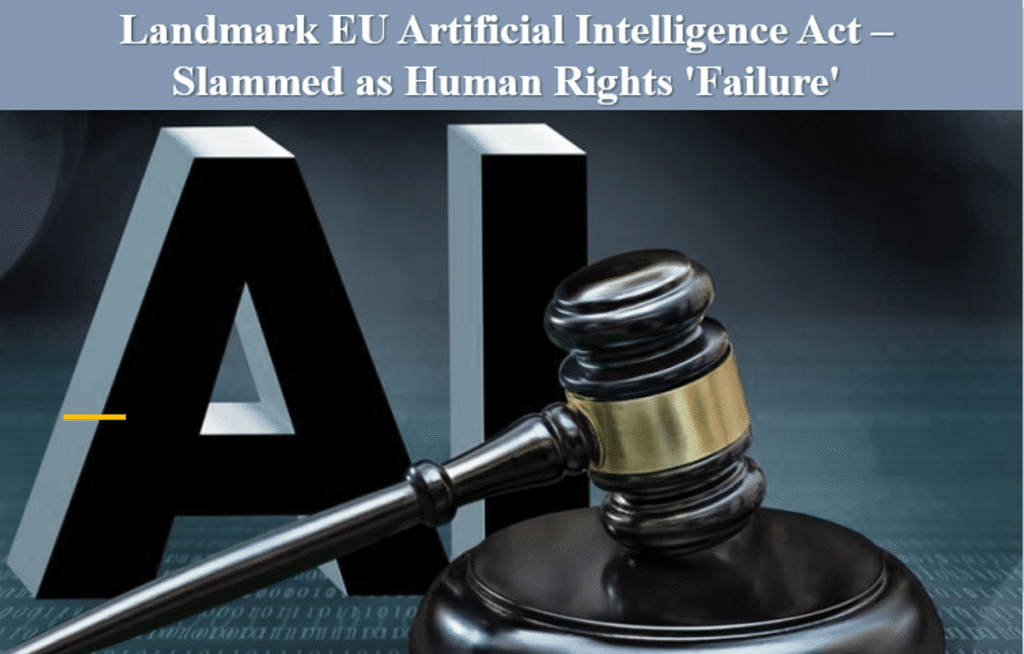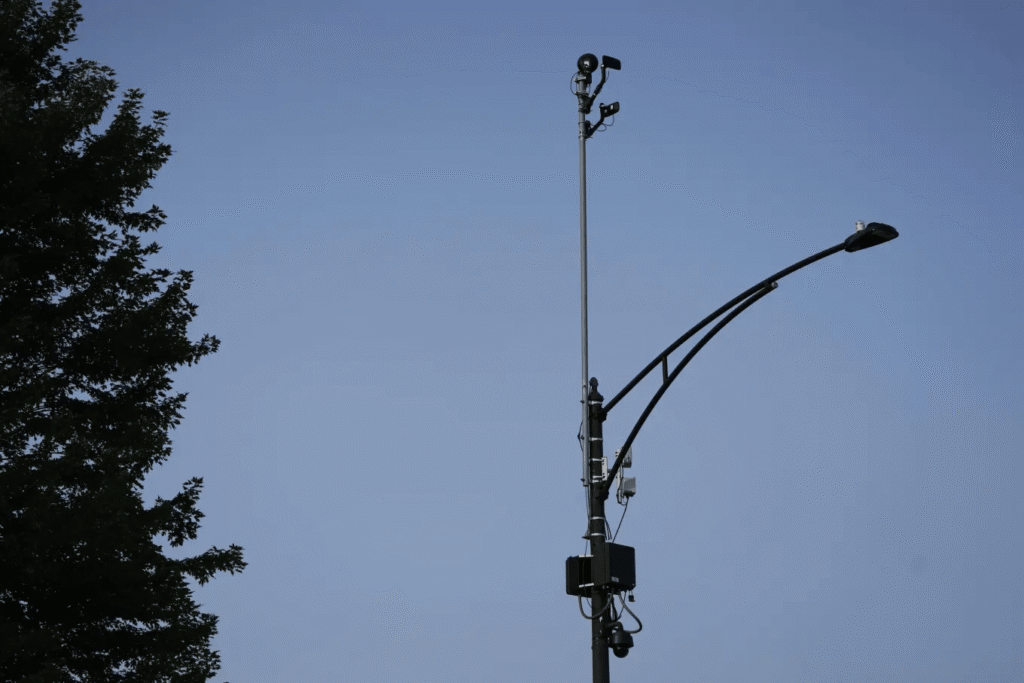
The world’s first regulations for the AI Act and the rapidly evolving AI technology were adopted by members of the European Parliament yesterday the 13th of March. The regulation,which was agreed by member states following negotiations in December 2023, was finally endorsed by MEPs with 523 votes in favour, 46 against and 49 abstentions (Source). EU policymakers have lauded the approval of the Act, but critics have warned that the legislation represents a giveaway to corporate interests, with one EU policy analyst stating that the digital policies are being used as a “testbed for oppressive surveillance representing a blatant attack on everyone’s fundamental rights
” as most of us would now have expected anyway.
A “Risk Based Approach”
The regulations which are expected to take effect in May or June after some final formalities with various provisions entering into force over the next few years “applies a “risk-based approach” to AI products and services.” the Associated Press reported on Wednesday, they wrote: “The vast majority of AI systems are expected to be low risk, such as content recommendation systems or spam filters. Companies can choose to follow voluntary requirements and codes of conduct. High-risk uses of AI, such as in medical devices or critical infrastructure like water or electrical networks, face tougher requirements like using high-quality data and providing clear information to users.”
Some AI uses are banned because they’re deemed to pose an unacceptable risk, like social scoring systems that govern how people behave, some types of predictive policing, and emotion recognition systems in school and workplaces. Other banned uses include police scanning faces in public using AI-powered remote “biometric identification” systems, except for serious crimes like kidnapping or terrorism.
While some had praised the act for it’s “positive common sense guidelines and protections”, the Artificial Intelligence Act, has garnered many other critics.

Failure From a Human Rights Perspective
“It can’t be denied that this is a historic moment both in the EU and globally: a law to govern artificial intelligence has been agreed on by the EU, It is the first of its kind in the world. It’s a long-awaited, hard-fought-over and lengthy piece of legislation.” wrote Laura Lazaro Cabrera, counsel and director of Center for Democracy & Technology (CDT) Europe’s Equity and Data Program, on Wednesday,
“But for CDT Europe, it is a mixed bag when it comes to protecting human rights – one of its key aims, after all.” she argued and that the law “will become the benchmark for AI regulation globally in what has become a race against the clock as lawmakers grapple with a fast-moving development of a technology with far-reaching impacts on our basic human rights.”
The Act introduces important limitations on law enforcement’s use of AI, yet lawmakers failed to implement a total ban on the use of untargeted facial recognition by law enforcement and the CDT and other human rights advocates warned that such use would pose unacceptably high human rights risks, in particular for marginalised and at-risk communities, according to Lazaro Cabrera.
Threat to the Right to Protest
She adds “Serious risks to human rights when it comes to AI remain in the AI Act. For example, the law’s exemptions for facial recognition threaten to “swallow the rule” and allow for widespread facial scanning by law enforcement on the EU’s streets – a serious threat to, for example, the right to protest….”
“The Act also creates what could easily be an over-exploited exemption for national security. While the Act does ban use of emotion recognition technologies, that ban only applies to education and the workplace, leaving unanswered questions as to why the Act did not adopt a ban on the use of these technologies as the starting position.”
A Victory for Industry and Police
Daniel Leufer, a senior policy analyst at the Brussels office of advocacy group Access Now, called the bloc’s landmark AI legislation “a failure from a human rights perspective and a victory for industry and police.” and he warned that the legislation represents a giveaway to corporate interests and falls short in key areas,
“The new AI Act is littered with concessions to industry lobbying, exemptions for the most dangerous uses of AI by law enforcement and migration authorities, and prohibitions so full of loopholes that they don’t actually ban some of the most dangerous uses of AI.” according to Leufer.
Access Now notes in particular that the final version of the AI Act:
- Fails to properly ban some of the most dangerous uses of AI, including systems that enable biometric mass surveillance and predictive policing systems;
- Creates a glaring loophole via Article 6(3) for developers to exempt themselves from obligations for high-risk AI systems,;
- Exempts law enforcement and migration authorities from important public transparency requirements when they use high-risk AI, meaning they can continue deploying dangerous systems in secret;
- Further broadens the national security exemption beyond what is allowed for in the EU treaties, allowing governments to exempt themselves from obligations under the AI Act in order to pursue cases deemed relevant to national security;
- Creates a separate regime for people migrating, seeking refuge, and/or living undocumented, leaving with them far fewer rights than EU citizens and almost no access to remedy when these rights are violated.

EU is “Prioritising the Interests of Industry and Law Enforcement”says Amnesty International.
Amnesty International’s advocacy adviser on artificial intelligence, Mher Hakobyan said “Even though adopting the world’s first rules on the development and deployment of AI technologies is a milestone, it is disappointing that the E.U. and its 27 member states chose to prioritise the interest of industry and law enforcement agencies over protecting people and their human rights,”
Along with also expressing concerns about how the law will impact migrants, refugees, and asylum-seekers, Hakobyan highlighted that “it does not ban the reckless use and export of draconian AI technologies.”
“Poses Significant Risk to Persons With Disabilities…”
“Artificial intelligence can pose significant risks to persons with disabilities and other marginalised groups if it is not properly regulated. The AI Act addresses human rights, but not as comprehensively as we hoped for– we now call on the European Union to close this gap with future initiatives.”
Yannis Vardakastanis, president of the European Disability Forum, said in a statement that “the AI Act addresses human rights, but not as comprehensively as we hoped for—we now call on the European Union to close this gap with future initiatives.”

Protect Not Surveil
Access Now and Amnesty are part of the ProtectNotSurveil coalition, who released a joint statement warning that the AI Act “sets a dangerous precedent,” particularly with its exemptions for law enforcement, migration officials, and national security.
Other members of the coalition include EuroMed Rights, European Digital Rights, and Statewatch, whose executive director, Chris Jones, said in a statement “It has severe shortcomings from the point of view of fundamental rights and should not be treated as a golden standard for rights-based AI regulation.”
Legislation Should Prioritise People and their Rights
Campaigners hope policymakers worldwide now take lessons from this legislative process and for the campaigners the legislation should respect the people and prioritise their Human Rights.
Amnesty’s Hakobyan emphasized that “countries outside of the E.U. should learn from the bloc’s failure to adequately regulate AI technologies and must not succumb to pressures by the technology industry and law enforcement authorities whilst developing regulation. States should instead put in place robust and binding AI legislation which prioritises people and their rights.”
Lazaro Cabrera stressed that “there’s so much at stake in the implementation of the AI Act and so, as the dust settles, we all face the difficult task of unpacking a complex, lengthy, and unprecedented law. Close coordination with experts and civil society will be crucial to ensure that the act’s interpretation and application mean that it is effective and consistent with the act’s own articulated goals: protecting human rights, democracy, and the rule of law.”
European Center for Not-for-Profit Law’s Karolina Iwańska responded similarly: “Let’s be clear: It has severe shortcomings from the point of view of fundamental rights and should not be treated as a golden standard for rights-based AI regulation. Having said that, we will work on the strongest possible implementation.”
Access Now state that “Despite the AI Act’s profound shortcomings, Access Now will work with civil society partners to push for the strongest possible implementation of the AI Act and the few rights-protecting tools it includes, while continuing to monitor and call out AI-facilitated abuses.”
The Expose Urgently Needs Your Help…
Can you please help to keep the lights on with The Expose’s honest, reliable, powerful and truthful journalism?
Your Government & Big Tech organisations
try to silence & shut down The Expose.
So we need your help to ensure
we can continue to bring you the
facts the mainstream refuses to.
The government does not fund us
to publish lies and propaganda on their
behalf like the Mainstream Media.
Instead, we rely solely on your support. So
please support us in our efforts to bring
you honest, reliable, investigative journalism
today. It’s secure, quick and easy.
Please choose your preferred method below to show your support.
Categories: Breaking News

Very straighforward question, do people matter or is it all to protect a very few greedy ones grabbing all the cake first?
“Compliance with Rights and Boosting innovation” more word salad from these lying power grabbing Despots, they aim to coral us all so its easier to kill us all , and its easier to kill someone if you know exactly where they are !
“Vladimir Putin signed Executive Order On Awarding the 2023 Presidential Prize in Science and Innovation for Young Scientists.
February 7, 2024
Having considered the proposals of the Presidential Council for Science and Education, I decide:
To award the 2023 Presidential Prize in Science and Innovation for Young Scientists and the honorary title of Laureate of the Presidential Prize in Science and Innovation for Young Scientists:
Susanna Gordeeva, Doctor of Physical and Mathematical Sciences, Professor of the Lobachevsky National Research University of Nizhny Novgorod, for the development of models and technologies of neuromorphic artificial intelligence based on biophysical neuron-astrocyte network models for memristive electronics
..
(*The picture on the main page in the official website of the Decade of Science and Technology in Russia, Nauka.rf(=Science.rf), about the article “DIGITAL EVOLUTION: HOW SCIENTISTS CREATE NEUROMORPHIC SYSTEMS” where is the interview with Susanna Gordeeva
“March 5, 2024
Artificial intelligence technologies have become almost commonplace. Neural networks help diagnose diseases, become business consultants, and automate workflows. But there are tasks that algorithms are not yet able to do. For example, to completely reproduce the work of the human brain. Such developments at the intersection of biophysics, mathematics and biology are considered to be among the most promising in the world.
..
Question: In what areas can such a neural network be used?
Susanna Gordeeva: In fact, in any place where information processing is needed. But one of the promising tasks, perhaps, is the creation of neural implants or neural interfaces. Such systems record brain activity. Therefore, it is necessary that information processing should be carried out with the help of systems adapted to biological mechanisms.”
and so on…